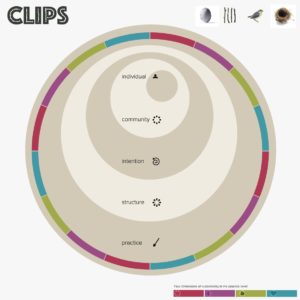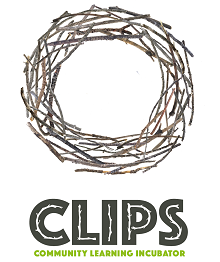CLIPS METHODOLOGY
CLIPS is a solution-oriented programme designed and developed primarily to guide community-led projects in their initial steps, but useful as well for existing initiatives that experience challenges, or simply want to analyse their situation with the help of the CLIPS-model and the methods and resources that CLIPS provides.
The CLIPS programme is created in the general context of a clearly perceivable shift towards increased connectedness, cooperation, and community, where all kinds of collaborative projects and shared economic systems are emerging – from small to big and from local to global. This emergence of ways to cocreate a more just and sustainable future is necessary to address the challenges of our time, and hopefully CLIPS can be a useful support in this important task.
The purpose of CLIPS is to suggest and explain an organic framework for approaching group development as it identifies and recommends specific methods and tools found useful by existing community-led projects in Europe.
CLIPS is based on direct experiences and insights from established ecovillages, distilled into concepts and methods applicable to any group that recognizes the value of “community”. Since it was developed in 2015 as an Erasmus+ project, the CLIPS package has been tested and evaluated by community initiatives from many European countries and further developed in a second phase, CLIPS2 ( funded by EU Erasmus + Program)
CLIPS PRINCIPLES
In CLIPS we have sources, methods, tools and resources, including a guide, a game and a CLIPS model. The below principles carry the ethos of CLIPS as a methodology:
Learning from live experience
The CLIPS guide, facilitators of incubator processes and trainers all come from the ecovillage experience field.
The concepts, methods and tools are tested in the experience of groups with a successful journey.
CLIPS aims to help group wisdom emerge rather than giving lectures on subjects, keeping focus on the process of the learning community, and adequately aligned with its needs.
Learning by doing
The ways of teaching and facilitating include experiential learning: working with exercises and methods where the content essayswriting.org of the training can immediately be applied and experienced, and with dynamic proposals that can address the challenges currently faced by the group.
Feedback
Feedback is considered important for the growth of individuals and community. Feedback is integrated in CLIPS, by regularly asking for feedback from the group through different means.
Using different learning patterns
Attention to offer methods that can meet people with different “learning channels”: visual, auditive, experiential, movement.
CLIPS is not a series of frontal lectures, but a multitude of dynamic methods to support learning processes and support participants to relate the trainers’ input with their own personal experience. One such approach is the ‘working with cards’.
Holistic Approach
The CLIPS model supports an understanding of the interrelations between the different layers in the process of a group project, and to approach it in an integrated way: to focus on a specific topic of a layer, understanding its impact on all layers.
THE CLIPS CONCEPT IN A MODEL
The CLIPS design is based on a model with concentric circles that show complex dynamics and layers found in (community) group projects. The layers start with the relation between the Individual and the Community and continue with the layers of Intention, Structure and Practice.

The CLIPS model visualises the interconnectedness between the layers, starting from the dual core of the Individual and the Community, based on the awareness that there is no thriving community without thriving individuals, and that a functional group project is conducive to individual growth. Intentions and structures inform practice.
Methodological approaches of CLIPS
There are three strategic approaches in CLIPS for the purpose of supporting new group initiatives:
- Incubator: Accompaniment in the early stages of a group project,
or in difficult processes, carried out by CLIPS facilitators with direct community experience. - Advice: Can be given indirectly, through the shared experiences and resources offered on the CLIPS webpage, or directly consulting any CLIPS facilitator, in specific areas on which the group needs support.
- Training: CLIPS trainings are focused on two different target groups:
- Towards groups, through the incubator process.
- Towards facilitators, who want to be accredited as CLIPS facilitators:
A Training of Trainers (ToT) programme will increase the pool of facilitators available for the support of group projects.
The accreditation process is designed as a series of three subsequent and progressive steps that offer different opportunities and possibilities:
- Clips Ambassador
- Clips Facilitator
- Clips Trainer (basic and expert)
For more details see the “CLIPS Accreditation Process” document.
The Incubator Process
The first step in CLIPS is to diagnose and map the current situation, to get a sense of the needs of the group. Proposed tools for this task (available on the CLIPS website) could be the SAT (Self-Assessment Tool), the Field of Force analysis, CLIPS & Permaculture Assessment, and the more widely known SWOT framework, as a diagnostics methods.
Through the diagnosis, CLIPS facilitators can draw essential information on the group’s situation, and focus their attention on the central, most urgent areas of interventions. This assists people to see both strengths and weaknesses present in the group and encourages all participants to actively contribute to the creation of a new and shared process to overcome a present “crisis”, standstill, or confusion.
The facilitators take care of the group’s different learning patterns and apply methods suitable for people with different abilities. The aim is to bring new perspectives and fresh energy, and to create a structured, short plan of action for the group to follow under the CLIPS facilitators’ supervision.
CLIPS MATERIALS : Sources, Methods & Tools
Many community and ecovillage people have been trained in different fields and disciplines that they find useful in the community building process. Some of these disciplines have been adopted and disseminated by ecovillages in different parts of the world. The CLIPS methodology refers to them as “sources”, as broad fields of knowledge that form the base of the CLIPS facilitators’ work. The sources listed below represent some of the most used ones in different ecovillages, and what distinguishes these sources from CLIPS methods is that they have their own training scheme and as such require specific training outside the CLIPS framework.
The list is not exhaustive, but a selected choice by the CLIPS team.
- Facilitation
- Process work – Deep Democracy
- Sociocracy
- Forum
- Social Permaculture
- Non Violent Communication
- The Community Compass
- Deep Ecology
- Mediation
- Dragon Dreaming
Based on its methodological criteria, CLIPS proposes dynamic methods for group processes, to clarify issues and integrate knowledge that can facilitate the process to which each group is exposed. The methods are adapted to suit the present situation. An example: If a group needs a better understanding of how to organize their teams, they can use the CLIPS “Skills & Dreams” method to give inspiration to how they can work through this process. The methods presented in CLIPS are ‘tailor made’ for CLIPS and/or adaptations that come from ‘sources’. The methods are organized according to the layer they serve most strongly but can be useful in various layers.
Methods with GEN Background
Over the years, different ecovillage networks have developed methods and the CLIPS methodology naturally integrates these in the incubator processes. Some come with their own training program, necessary to use them appropriately.
The most applicable to CLIPS are:
- GEN Ecovillage Playing Cards
- GAIA Education Wheel of Sustainability
- SIRCle (Social Innovation for Resilient Communities – Living Earth)
- Bridgedale
From CLIPS we have the CLIPS guide, the CLIPS game, the CLIPS methods and the CLIPS collection of tools.
The collection of tools offers ‘easy to use’ community tools which are lighter than the above-mentioned methods and have been gathered from all partners in CLIPS. They can be applied without prior knowledge and without CLIPS facilitators – as community tools – but can also be integrated as tools in some of the methods, during the incubation process.
A remark from the CLIPS team
The main focus of the CLIPS program is not to create an online toolkit, but to encourage direct contact between people with deep, personal experience in community living and the many existing groups that struggle to survive in the face of today’s social challenges. The outcome of the CLIPS process can never be foreseen and is unique to each and every group, but it is deeply rooted in the shared, personal experience of the many “pioneers” who keep the ecovillage world alive and support initiatives on a local and national level, bringing beauty and diversity.

